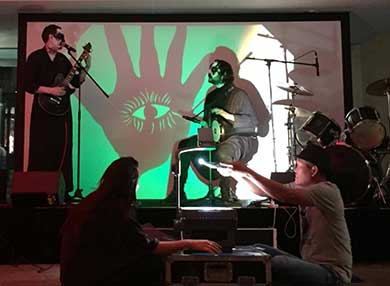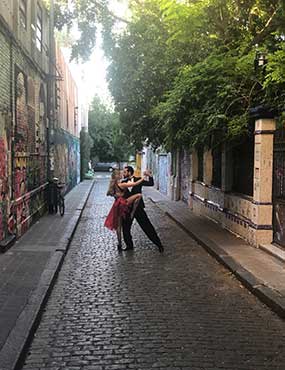Collaborate with us
The Macquarie School of Social Sciences has expertise in researching a wide variety of social and environmental issues.
Our labs program supports the development and application of key social science skills that can be applied to a diverse projects and issues.
Please visit the lab pages listed below and get in contact with lab leaders if you would like to discuss potential collaborations.
Members
Anna-Karina Hermkens (convenor), Banu Senay, Chris Houston, Justine Lloyd, Rhonda Davis (Senior Curator MQ Art Gallery), Kate Lloyd, Sandie Suchet-Pearson, Can Yalcinkaya (MQ University International College), Daniel Tranter (PhD student Anthropology), Louise Decottigny (PhD student Anthropology), Lillian Tait (PhD student Geography and Planning).
About our lab
The Art Ethnography lab focuses on the interface between ethnography (qualitative research methods) and art, exploring poetry, fine arts (including and moving beyond photography, film, and multi-media to incorporate comics, drawing, painting, printing, sculpture etc), and performance arts (including dance, music, hip-hop, soundscapes etc) as an ethnographic practice, method, and experience.
The lab offers a shared space for collaboration and inspiration within the School, while creating networks with other MQ departments (such as the Art Gallery, and the Department of Media, Music and Communication Studies). It conducts collaborative projects and community outreach, and encourages researchers, students and invited artists, as well as the public, to develop projects together and explore multimodal ethnography as a research method. The lab aims to host workshops, exhibitions, and performances in collaboration with MQ Art Gallery, thereby extending possibilities for community participation and outreach.

Participants engage with questions like: “How can the synergy between ethnography and art help us think about complex social processes, from climate change and species extinction to racialization, refugee rights, and collective memory?” (Stainova and Craig 2021). In particular, participants pursue new ways of understanding the meanings that are produced in art ethnographic work, and how the fusion of different mediated art forms, practices and experiences engages with and produces ‘multi-semiotic’ ways of being in the world.
We welcome enquiries and opportunities for collaborative or funded research projects.
Members
Ben Spies-Butcher (convenor), Hang Young Lee, Eve Vincent, Dylan Sullivan
About our lab
The Australian Basic Income Lab (ABI) aims to become the preeminent hub for basic income research and outreach in the Asia-Pacific region.
Growing interest in basic income reflects widespread concern over entrenched poverty, insecure work and rising inequality. Basic income pilots, political campaigns and ‘natural experiments’ have raised the profile of basic income and attracted the attention of diverse researchers from around the world.

The ABI Lab brings together researchers in the Macquarie School of Social Sciences with leading researchers from the Crawford School at the Australian National University and Sydney University’s School of Social Sciences, as well as others across the Macquarie campus. We explore different responses to poverty, inequality, economic insecurity, and conditionality, using Basic Income as a lens to imagine different futures.
ABI partners with academics, civil society organisations, governments, unions and business to inform and advance interdisciplinary research and public debate regarding a new social and economic security agenda. Our seminar series, workshops and public events with leading local and international scholars, policymakers and other stakeholders contribute critical insights and diverse perspectives on the basic income debate.
For more information please see: www.ausbasicincome.org/
We welcome enquiries and opportunities for collaborative or funded research projects and have particular expertise in:
- assessing poverty, income and wealth inequalities
- ecological transitions
- automation, precarity and the future of work
- comparative welfare state and social security systems
- social security and tax system design
- social impacts of welfare systems
- basic income experiments.
Members
Greg Downey (convenor), Kath Bicknell, Chris Houston, Alex Gillett (Philosophy), Samuel Jones (PhD candidate, Anthropology), Sara Kim Hjortborg (PhD candidate, Cognitive Science), John Sutton (Philosophy), Selvaraj Velayutham, Amanda Wise
About our lab
The Microethnography Lab in the MQ School of Social Sciences supports digitally-enhanced observational field research, with a special focus on studying skills, including intercultural interaction, performance, perception, adaptive dispositions, habitus acquisition, and practical learning. Projects include research on work, music composition, martial arts like muay Thai and tai chi, sports including mountain biking, cricket, and informal sport, skills in sensory perception, spatial navigation, dance, and communities of practice in craft, sport, and field science.

The researchers in the lab use rigorous qualitative and observational research techniques, especially low-cost video and audio recordings as well as other widely-available tools to enhance ethnographic research. Although the techniques can be used more broadly, we have a current focus on cognitive ecology, distributed cognition, social interaction research, and neuroanthropology.
The Microethnography Lab is now facilitating the research for the project, “Concepts in Dynamic Assemblages: Cultural Evolution and the Human Way of Being,” funded by a major grant from the John Templeton Foundation. We also support partner-based research with businesses and non-governmental organisations.
We welcome enquiries and opportunities for collaborative or funded research projects and have particular expertise in:
- user research
- interaction and performance analysis
- the study of learning environments, especially for skills and sports.
Members
Fiona Miller (convenor), Donna Houston, Jess McLean, Emily O'Gorman, Emily Potter, plus many more in the broader network.
About our lab
The Shadow Places Network is a network of scholars, artists and activists who collaborate to document, co-produce and reimagine connections between places and peoples in an era of climate change.
The network seeks to make visible the place-based, material and imaginative structures, practices and relations that sustain the exploitative capitalist system, and the modern global history of colonisation, that underpin climate change. These structures, practices and relations actively construct a geography of injustice constituted of multiple shadow places.

Simultaneously the network seeks to document and reimagine more just and ethical connections and understandings of place. We are committed to transnational, cross-cultural, cross-disciplinary and more-than-human collaborations, and invite the open participation of others committed to environmental justice and to find new ways of imagining, organising and practicing collaborative enquiry and environmental activism.
For more information please see: www.shadowplaces.net/
Members
Adam Stebbing (convenor), Jacqueline Mackaway (convenor), Shaun Wilson, Ben Spies-Butcher, Catherine Hastings, Michael Fine, Tobia Fattore, Fiona Miller, Alison Ziller, Andrew Burridge, and Miriam Williams
About our lab
The Social Policy Evaluation Lab applies evaluation theory to advance evidence-informed social policy development and practice. Social policy can be broadly understood as government interventions that aim to increase the wellbeing of individuals, families, and society at large.
Social policies assist people at particular times of life (such as parenting or retirement) and when they have claims to enable their active participation in society. These policies take many forms, including a wide array of policy instruments, programs and projects that involve the public, non-profit and/or private sectors.
Among the actions of government that have most bearing on the everyday lives of citizens, social policies provide support for retirement, families, disabilities, housing, health, education and more.

Quality evidence of ‘what works’ is crucial (such as gaining education, accessing paid employment) to inform the development of effective and efficient policy. This is particularly crucial in the field of social policy, considering the life-changing potential of support for consumers, the wide range of program design choices, and the limited funds available.
The Social Policy Evaluation Lab contributes to evidence-informed practice by developing, sharing, and innovating applied social science methods to systematically assess social policies at any stage of their development (before, during or after implementation) including impact assessments. The lab seeks to disseminate practical information on applied social science methods, strengthen research and policy networks, and connect academics with partners in the public and private sectors to develop collaborations.
We welcome enquiries and opportunities for collaborative or funded research projects on all aspects of social policy. We have considerable domestic and international experience undertaking applied research with community, government and industry partners and have advanced expertise in all aspects of social research, including:
- qualitative, quantitative and mixed methods research eg survey design, qualitative interviews, focus group discussions etc
- community and stakeholder consultation
- monitoring and evaluation
- formal assessment, including social impact assessment, vulnerability assessment, gender-sensitive evaluations
- intensive training on social research methods and frameworks
- mentoring support, including feedback on instruments, reports etc
- research communication and dissemination.
Our approach to social research is highly ethical and sensitive to the needs of our partners.